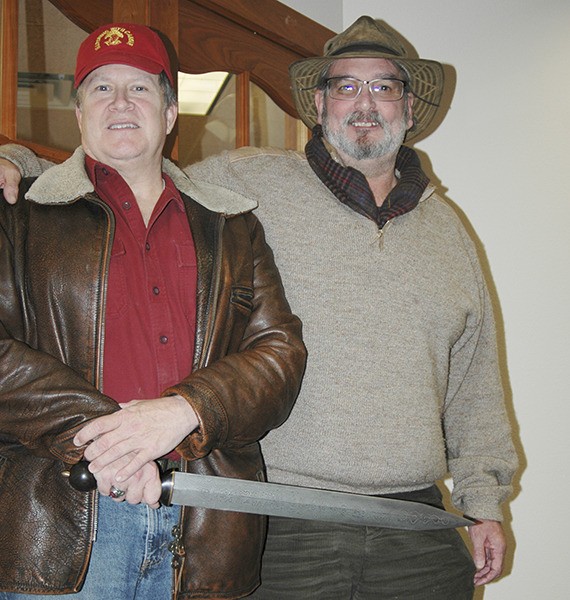Gladius, or better known as the primary swords used by Roman foot soldiers, are the focus of local artist Kelly Cox.
Cox, owner of sword making company Olympic Gladius, was inspired to construct a limited number of unique, artfully designed swords in the midst of reading the series “Marching with Caesar” by Sequim author Ron Peake.
The historical fiction series is written from the perspective of character Titus Pullus who joined the 10th Legion in 61 B.C., to serve as a soldier under Gaius Julius Caesar. With an education in history and as a retired infantry Marine, Peake combines his areas of expertise to captivate readers like Cox.
“I read the first book and after that I knew I needed more,” Cox said. “Half way through the series, I decided this book needed a sword.”
When devoted fan Cox called Peake to tell him about the swords he planned to produce, Peake openly admits he was “absolutely floored.”
“As good as I am at describing things, that is kind of an indescribable feeling,” he said. “I’ve gotten a lot of different things from fans, but I think the sword is probably going to be at the top of the list in the foreseeable future.”
Peake now owns the first Titus Pullus Commemorative Sword created, which is one of a limited 25 handcrafted blades from Damascus steel, rolled and hammered into shape.
Although the swords are a reflection of pure craftsmanship in every way, it took finding the right artists to bring Cox’s vision to reality.
“I guess the hardest part was I had the design of the sword in my mind, but I didn’t have the equipment to build something like it,” Cox said. “To be able to round up the right guys was a lot of fun and a challenge, too.”
By knocking on doors and pitching the project, Cox has collaborated with nearby artists in Port Townsend from Admiralty Precision, Massey Copper and Rain Shadow Woodworks, Inc., to bring the sword of Peake’s pages and an example of history to life.
“All these guys do amazing work and are just all really down to earth people,” Cox said.
The final step to complete the swords and to reveal the unique pattern of each blade requires about 12-15 hours of sanding and acid-etching by Cox.
“When they come to me, you can’t see the pattern,” Cox said. “Having been in the food business, I realized phosphoric acid and citric acid are readily used so I tried it (acid-etching) with phosphoric acid and lo and behold I am able to do it with acid that I can pour down my kitchen sink.”
Having severe dyslexia, Cox was taken out of school in ninth grade to work for his father who owned multiple businesses. Cox worked primarily for the family pollution control business, as well as their food development business.
Working for his father early on fueled Cox’s inventive tendencies that have since led him to pursue a variety of things from designing and operating a mobile fish fertilizer production plant to being one of the first people to help introduce Global Electric Motorcars (GEM) to California.
Creativity grows
Continuing to find inspiration in Peake’s books and equipped with a team of artisans, Cox is designing a variety of limited edition swords beyond the Titus Pullus Commemorative Swords. Instead of commemorating a character however, the next set of swords will represent major moments in Roman history, like the battles of Philippi or Actium or the crossing of the Rubicon River.
Reviving the trademark “Cox Shucker” first established by Cox and his father in 1977, Cox also is producing high quality oyster shuckers resembling miniature versions of the Gladius.
Like Cox, Peake is continuing to revisit the ancient past and is working on more historical novels associated with but not part of the series. Peake released “Caesar Ascending: Invasion of Parthia” last November — the predecessor to “Caesar Triumphant” still in the making.
Peake’s recent and developing books are still rooted in historical accuracy, but delve further into the fictional what ifs. For example, “Caesar Ascending: Invasion of Parthia” explores the question of: What if Gaius Julius Caesar had heeded that warning and the other signs leading up to the Ides and survived that day in March of 44 B.C.?
For more information on the swords, visit olympicgladius.com or learn more about Peake’s books at marchingwithcaesarbookseries.com.
Reach Alana Linderoth at alinderoth@sequimgazette.com.



